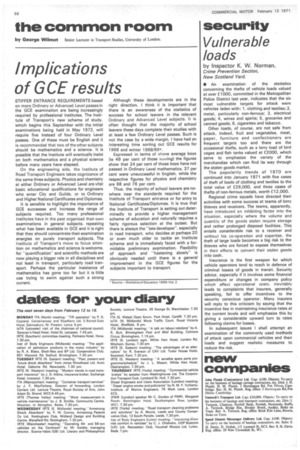security Vulnerable loads
Page 58

If you've noticed an error in this article please click here to report it so we can fix it.
by Inspector K. W. Norman, Crime Prevention Section, New Scotland Yard.
• An examination of the statistics concerning the thefts of vehicle loads valued at over £1000, committed in the Metropolitan Police District last year, indicates that the six most vulnerable targets for attack were vehicles laden with: 1, clothing arid textiles; 2, metal, particularly non-ferrous; 3, electrical goods; 4, wines and spirits; 5, groceries and canned goods; 6, cigarettes and tobacco.
Other loads, of course, are not safe from attack. Indeed, fruit and vegetables, meat, paper, furniture and confectionery are frequent targets too and there are the occasional thefts, such as a lorry load of bird cages and fish tanks valued at £2000, which serve to emphasize the variety of the merchandise which can find its way through the stolen goods market.
The popularity trends of 1970 are continued into January 1971 with five cases of theft of loads of clothing and textiles to the total value of £26,000, and three cases of thefts of non-ferrous metals, worth £12,000.
Regional crime squads have directed their activities with some success at teams of lorry thieves and receivers. The teams, apparently, have introduced an inhibiting factor into the situation, especially where the volume and quantity of the goods stolen require storage and rather prolonged disposal facilities. This entails considerable risk to a receiver and without his co-operation and expertise, the theft of large loads becomes a big risk to the thieves who are forced to expose themselves in their efforts to convert their stolen goods into cash.
Insurance is the first weapon for which vehicle operators tend to reach in defence of criminal losses of goods in transit. Security advice, especially if it involves some financial expenditure or changes in company policy which affect operational costs, inevitably leads to complaints that insurers, generally speaking, fail to offer incentives to the security conscious operator. Many insurers will reply to this criticism by saying that the incentive lies in maintaining insurance rates at the current levels and will emphasize this by giving a considerable upward turn to rates following claims for losses.
In subsequent issues I shall attempt an examination of the commonly used methods of attack upon commercial vehicles and their loads and suggest realistic measures to reduce the risk.
































































































